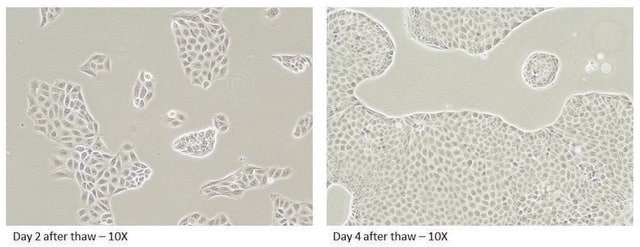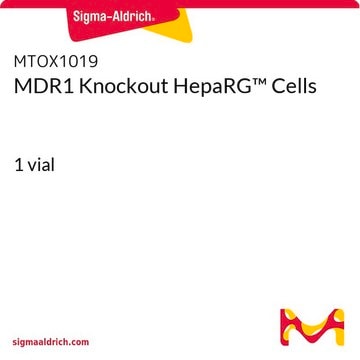MTOX1004
MDR1/BCRP Double Knockout Caco-2 Cells
Human male colorectal tissue, adenocarcinoma
Synonyme(s) :
C2BBe1 Cells MDR1/BCRP (-/-/-/-,-/-/-/-)
About This Item
Produits recommandés
product name
MDR1/BCRP Double Knockout Caco-2 Cells, one vial
Source biologique
human male colorectal tissue (Source disease: adenocarcinoma)
Forme
liquid
Technique(s)
drug transporter assay: suitable
permeability assay: suitable
Application(s)
ADME/TOX
Température de stockage
−196°C
Informations sur le gène
human ... ABCB1(5243) , ABCG2(9429)
Description générale
Application
Transporter Function in Caco-2 Cells with Targeted P-Glycoprotein, MRP2 and BCRP Gene Knockout Using Zinc Finger Nucleases
Comparison of Function and Relative Transporter Protein Concentrations in Caco-2 Cells with Single and Double Knockouts of the ABCB1, ABCG2, and ABCC2 Genes
Caco-2 Transporter Knockout Cell Based Assays
Caractéristiques et avantages
- A functional double knockout of the MDR1 gene and BCRP gene eliminates the reliance on chemical inhibitors to determine if a compound is an MRP2 substrate
- The vial format enables the MDR1 and BCRP knockout cells to be included in standard drug transporter protocols
- Human assay with no interference from animal inhibitors
- Overcome the limitations of RNAi and knockdown cell lines that arise from remaining transporter functionality
Informations légales
Clause de non-responsabilité
Composants de kit également disponibles séparément
- MTOX1004MDR1/BCRP Double Knockout Caco-2 Cells, one vial 1 vialFDS
Code de la classe de stockage
10 - Combustible liquids
Classe de danger pour l'eau (WGK)
WGK 3
Point d'éclair (°F)
Not applicable
Point d'éclair (°C)
Not applicable
Certificats d'analyse (COA)
Recherchez un Certificats d'analyse (COA) en saisissant le numéro de lot du produit. Les numéros de lot figurent sur l'étiquette du produit après les mots "Lot" ou "Batch".
Déjà en possession de ce produit ?
Retrouvez la documentation relative aux produits que vous avez récemment achetés dans la Bibliothèque de documents.
Articles
We presents an article on The Role of Intestinal Efflux Transporters In Drug Absorption.
We presents an article on The Role of Intestinal Efflux Transporters In Drug Absorption.
We presents an article on The Role of Intestinal Efflux Transporters In Drug Absorption.
We presents an article on The Role of Intestinal Efflux Transporters In Drug Absorption.
Notre équipe de scientifiques dispose d'une expérience dans tous les secteurs de la recherche, notamment en sciences de la vie, science des matériaux, synthèse chimique, chromatographie, analyse et dans de nombreux autres domaines..
Contacter notre Service technique




